Key takeaways:
- Performance motivation stems from achievement, support from others, and continuous learning from experiences.
- Identifying personal role models and setting clear performance goals enhances focus and accountability in personal growth.
- Embracing feedback, celebrating small achievements, and staying committed to practice foster resilience and sustained motivation.
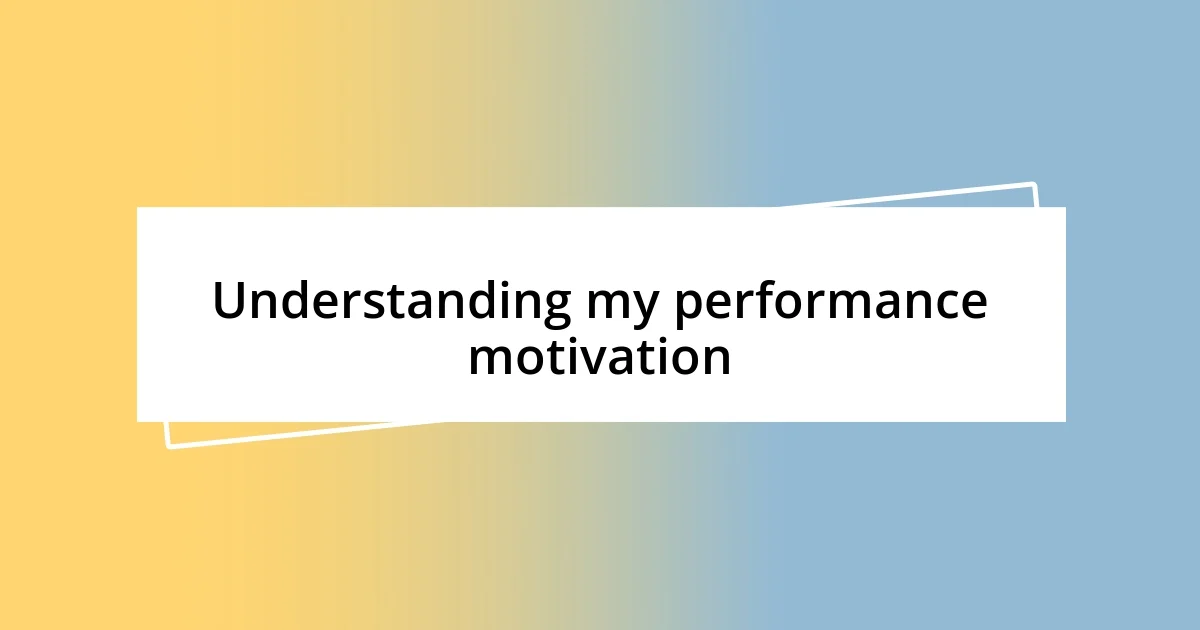
Understanding my performance motivation
When I reflect on my performance motivation, I find that a significant driving force is the sense of achievement that comes with accomplishing my goals. I remember the exhilaration I felt after completing a challenging project; it wasn’t just the project itself, but the realization that I had pushed my boundaries and grown. Isn’t it amazing how that sense of fulfillment can energize you for the next challenge?
Another critical aspect of my motivation lies in the support I receive from those around me. During a particularly tough time, my friends and colleagues encouraged me, reminding me of my potential. Their belief in me sparked something deep within, making me wonder: how often do we underestimate the power of our connections? This realization drives me to keep performing, not only for myself but also to honor those who believe in me.
Lastly, I must acknowledge the thrill of continuous learning. Every experience, whether a success or a failure, teaches me something valuable. I recall a time when I miscalculated a crucial deadline, but instead of viewing it as a setback, I focused on refining my time management skills. How can we view our failures as stepping stones? This mindset propels me forward, fuelling my commitment to always strive for improvement.
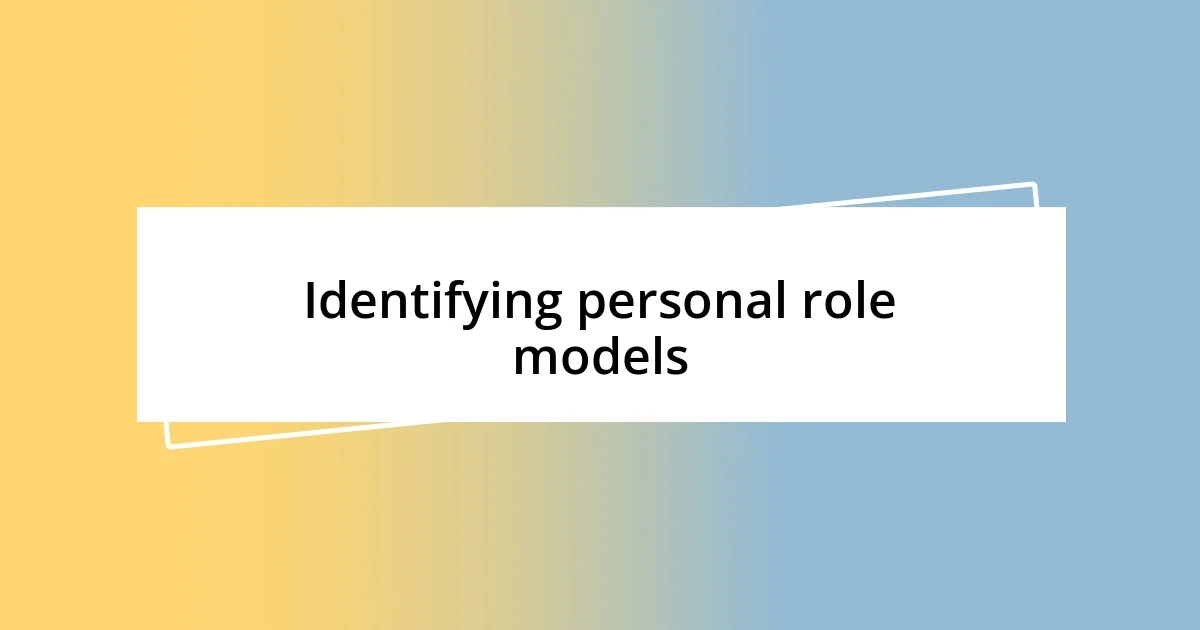
Identifying personal role models
Identifying personal role models has been an enlightening journey for me. I’ve realized that the people I admire don’t always fit the traditional mold of success; instead, they embody qualities I aspire to develop, like resilience and empathy. I think of a mentor who faced considerable challenges yet remained positive and supportive. Her ability to navigate rough waters taught me that true strength often lies in how we treat others during tough times.
To pinpoint your personal role models, consider these key aspects:
- Shared values: Look for individuals whose principles resonate with yours.
- Unique journeys: Examine their life stories; what experiences shaped them?
- Impact on you: Reflect on how their actions and words have inspired or motivated you.
- Emotional connection: Identify those you connect with on a personal level, sparking a sense of longing for growth.
- Diversity: Seek role models from various fields and backgrounds to broaden your perspective.
As I align myself with these qualities and experiences, I find a renewed vigor to chase my aspirations.
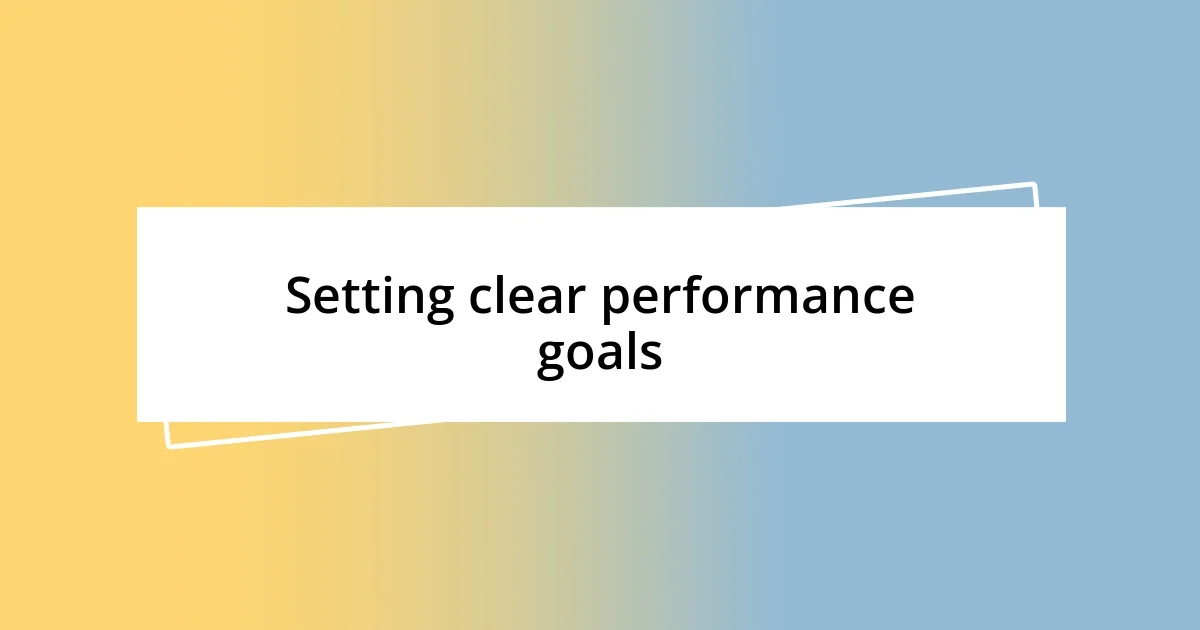
Setting clear performance goals
Setting clear performance goals is something I’ve come to realize is fundamental to my success. I recall a time when I decided to run a marathon. The way I broke the process down into smaller, manageable training goals helped me stay focused and motivated. It felt so rewarding to hit each milestone, whether it was running a certain distance or improving my time; each step made the journey to race day seem achievable.
What I’ve learned is that clear performance goals act as a roadmap. When I set specific milestones, I not only clarify my priorities but also create opportunities for regular reflection. For instance, after completing a project at work, I take a moment to evaluate what went well and what I can improve for next time. This reflection is crucial; it turns goals into tangible lessons, allowing me to adjust my approach for better results in future endeavors.
I often find that sharing my goals with others adds an element of accountability. During a recent team project, I voiced my intention to enhance my presentation skills. The support and feedback I received not only motivated me but also made me feel accountable. When we engage others in our journey, it can provide new perspectives and boost our commitment. So, how do you find the confidence to set your goals? Surrounding myself with supportive individuals has certainly made the process much easier for me.
| Performance Goal Setting | Benefits |
|---|---|
| Specificity | Helps to clearly define what you want to achieve, making it easier to stay focused. |
| Measurable Milestones | Allows for tracking progress, providing motivation as you reach each level. |
| Regular Reflection | Encourages evaluation of successes and areas for improvement, enhancing personal growth. |
| Accountability | Involvement of others boosts commitment and offers supportive feedback. |
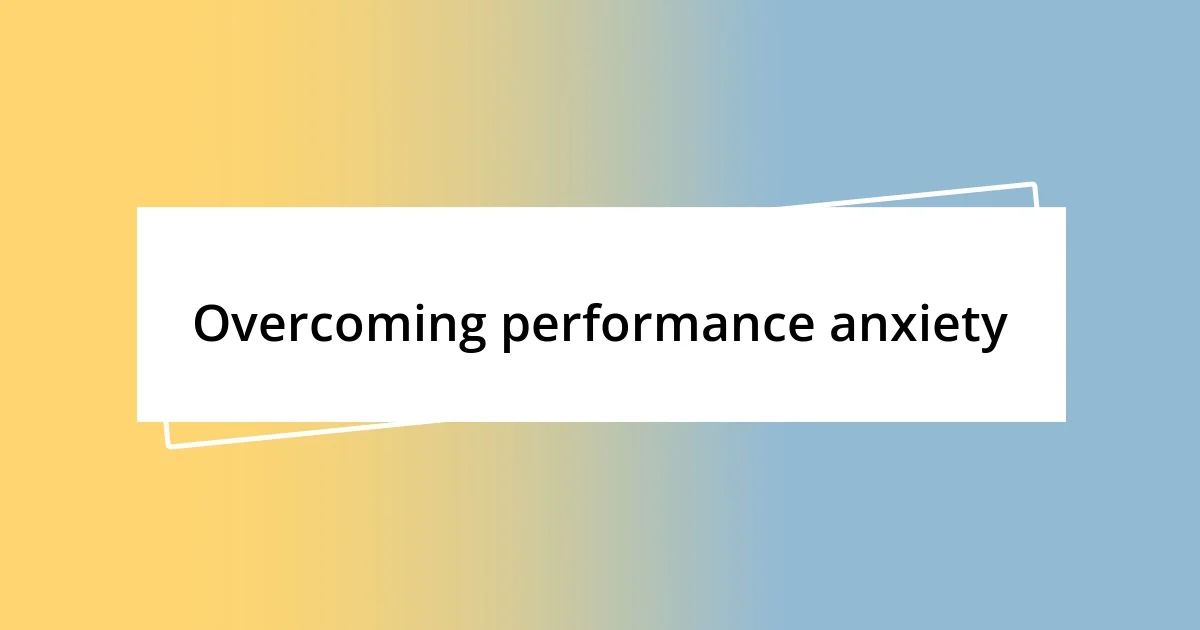
Overcoming performance anxiety
Performance anxiety can feel like an insurmountable wall, but I’ve found tools that help me climb over it. One strategy I adopted is deep breathing; short, focused inhalations followed by long exhalations calm my racing heart. I still remember a crucial presentation at work where I felt nerves grip me like a vice. By taking a moment to breathe, I centered myself and found my voice, transforming my anxiety into focused energy.
Another key to overcoming performance anxiety is reframing negative thoughts. Instead of thinking, “What if I fail?” I ask myself, “What can I learn from this experience?” This shift not only eases my fear but also opens my mind to see opportunities rather than obstacles. It’s fascinating how our perception shapes our reality. Have you ever noticed how a simple change in mindset can transform a daunting situation into a learning adventure?
Finally, celebrating small wins has been a game changer for me. Whenever I conquer a challenging situation, I take a moment to acknowledge my efforts, no matter how small. This practice fosters a sense of accomplishment and builds my confidence for future challenges. The last time I faced a crowd, I reminded myself of previous successes, and instead of succumbing to anxiety, I stepped up with determination. Isn’t it amazing how recognizing our progress can empower us to take on new feats?
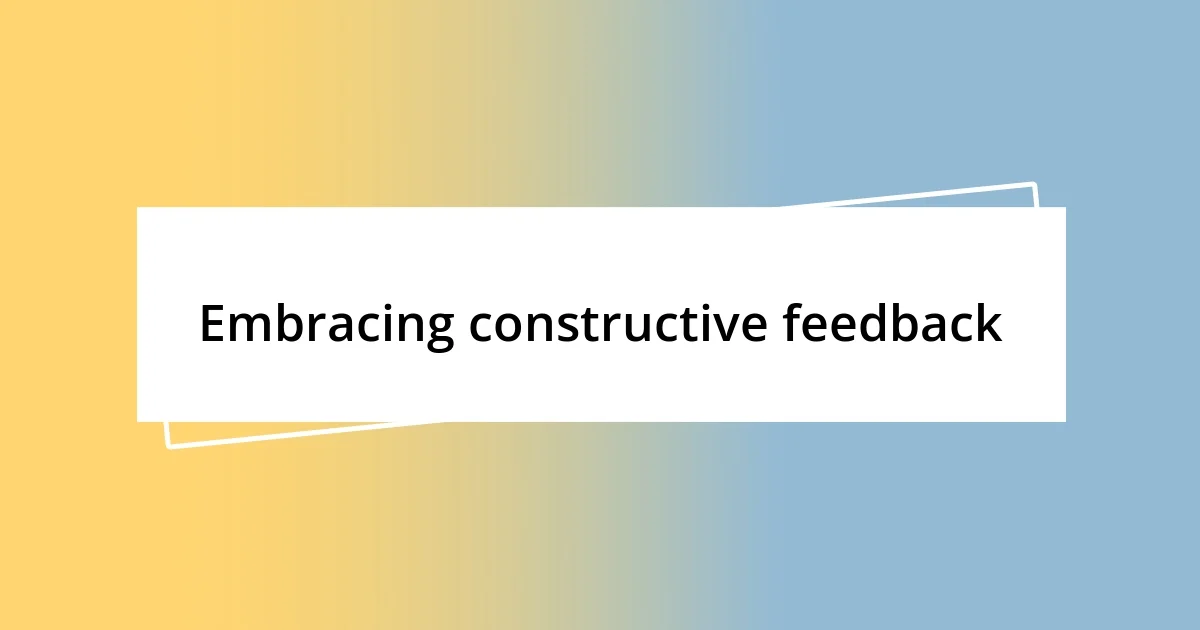
Embracing constructive feedback
Embracing constructive feedback has been pivotal in my journey. Rather than viewing feedback as criticism, I’ve learned to see it as an opportunity for growth. I remember a time when a mentor pointed out my tendency to rush through presentations. At first, it stung, but upon reflection, I realized that this insight helped me slow down, engage my audience better, and ultimately improve my delivery.
Sometimes, I ask myself: how can feedback shape my future performance? I make it a habit to actively seek feedback from peers and supervisors after each project. Recently, after submitting a proposal, I reached out for their thoughts. Their insights not only shed light on aspects I could improve but also highlighted strengths I hadn’t recognized. This exchange of ideas was invigorating; it made me feel connected and motivated to enhance my skills.
I’ve also found that removing ego from the equation is crucial. A while back, during a team review, I received feedback that my approach lacked creativity. Initially, I felt defensive, but I took a step back and considered their perspective. By embracing those suggestions, I was able to innovate my work in ways I hadn’t thought possible. That experience taught me a valuable lesson: feedback can be the spark that ignites new ideas and possibilities. How do you typically react to feedback? If we can see it as a pathway to improvement, it can truly transform our performance.
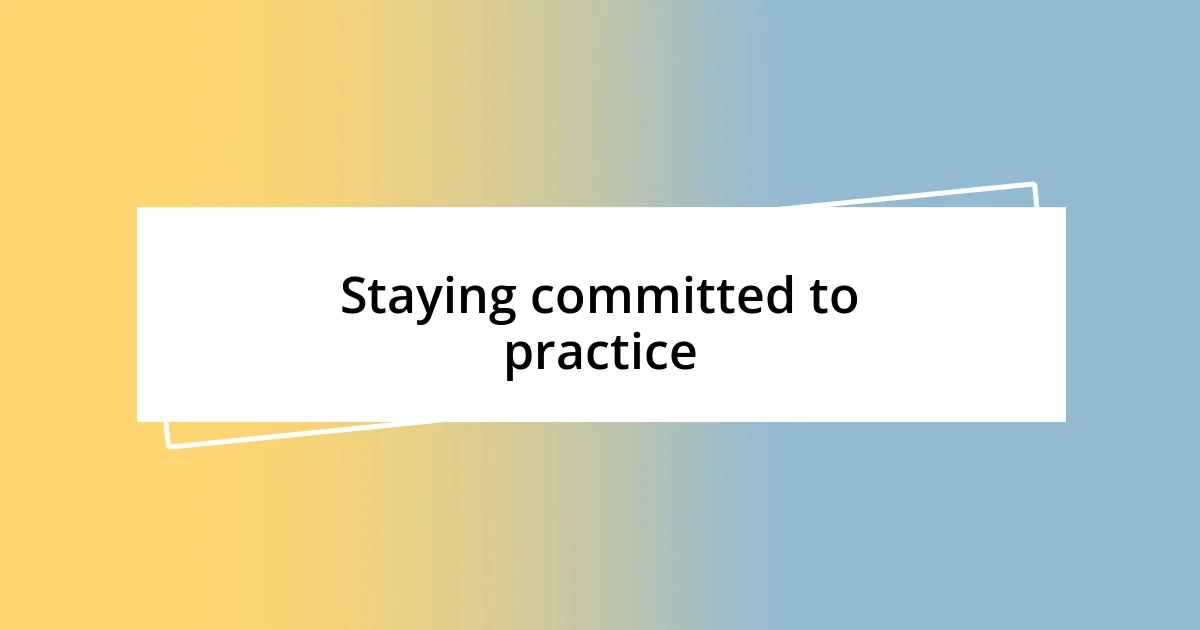
Staying committed to practice
Staying committed to practice often means navigating a rollercoaster of motivation. I remember a time when I felt completely drained after an intense week of rehearsals. It was during these moments that I realized the importance of carving out a dedicated practice space—both physically and mentally. When I commit to my space, it feels like an invitation for creativity to flourish, even on days when enthusiasm is low.
Having a consistent practice routine also keeps me accountable. I’ve discovered that setting specific goals helps me stay engaged. For instance, I once aimed to master a challenging piece that seemed impossible at first. Breaking the task into smaller segments transformed the overwhelming feelings into manageable steps. Have you ever experienced that joy of ticking off a goal? Each small victory fueled my motivation, reminding me that progress, no matter how tiny, is still progress.
Moreover, I find that the power of reflection plays a crucial role in staying committed. After every practice session, I take a moment to jot down my thoughts, noting what worked well and what didn’t. During one particularly tough week, I reflected on my sessions and noted improvements, which reignited my passion. Isn’t it amazing how looking back can renew our commitment? This process not only enhances my skills but also deepens my connection to my craft.
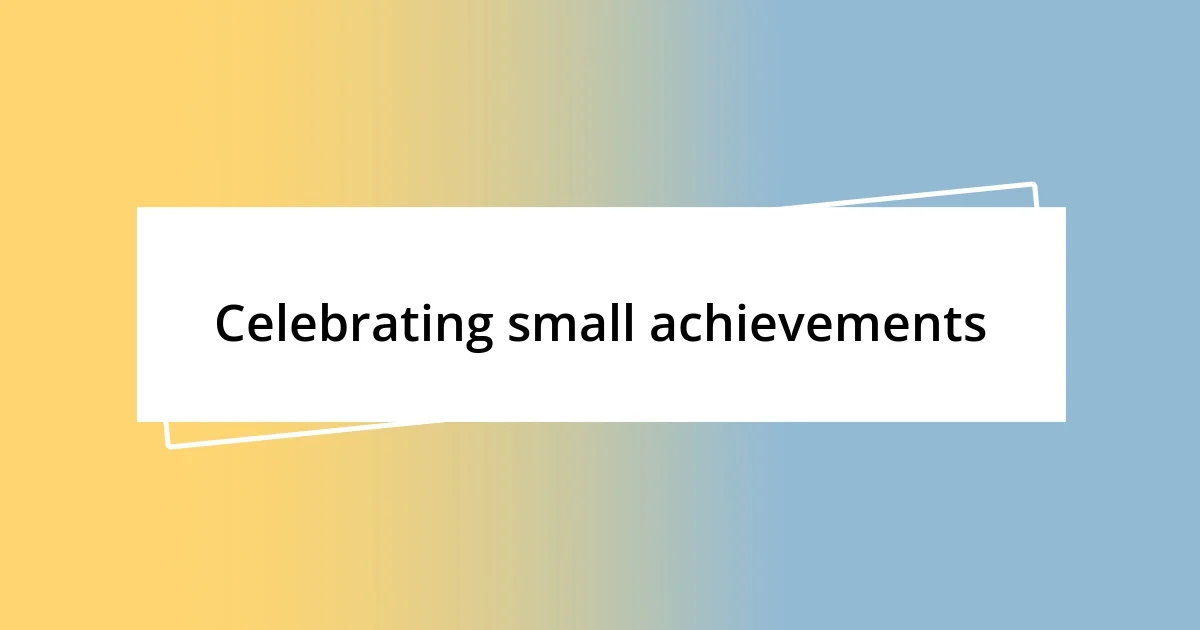
Celebrating small achievements
Celebrating small achievements is, in my experience, a game-changer for maintaining motivation. For instance, after completing a particularly challenging project, I made it a point to acknowledge that accomplishment. I treated myself to a favorite coffee shop visit, allowing me to bask in the achievement moment. Why is it that we often overlook these little victories? Taking time to celebrate them not only boosts morale but also creates a positive feedback loop that encourages further progress.
On another occasion, I started tracking my daily tasks in a journal, marking off each completed item. It might seem trivial, but seeing those checkmarks accumulate was surprisingly uplifting. Each tick felt like a badge of honor, reminding me that even the smallest tasks contribute to the bigger picture. At what point do we start recognizing the everyday milestones? I find that actively celebrating these achievements propels my motivation, making me eager to tackle the next challenge.
Moreover, I’ve learned that sharing these small wins with friends or colleagues amplifies their significance. Recently, after finishing a minor but intricate task, I excitedly shared the news with my close circle. Their enthusiastic responses not only inflated my sense of accomplishment but also solidified it in my memory. Isn’t it interesting how a moment of recognition can enhance our appreciation of our journey? Celebrating achievements—big or small—creates an invaluable sense of community and connection, fueling the drive to keep performing.














